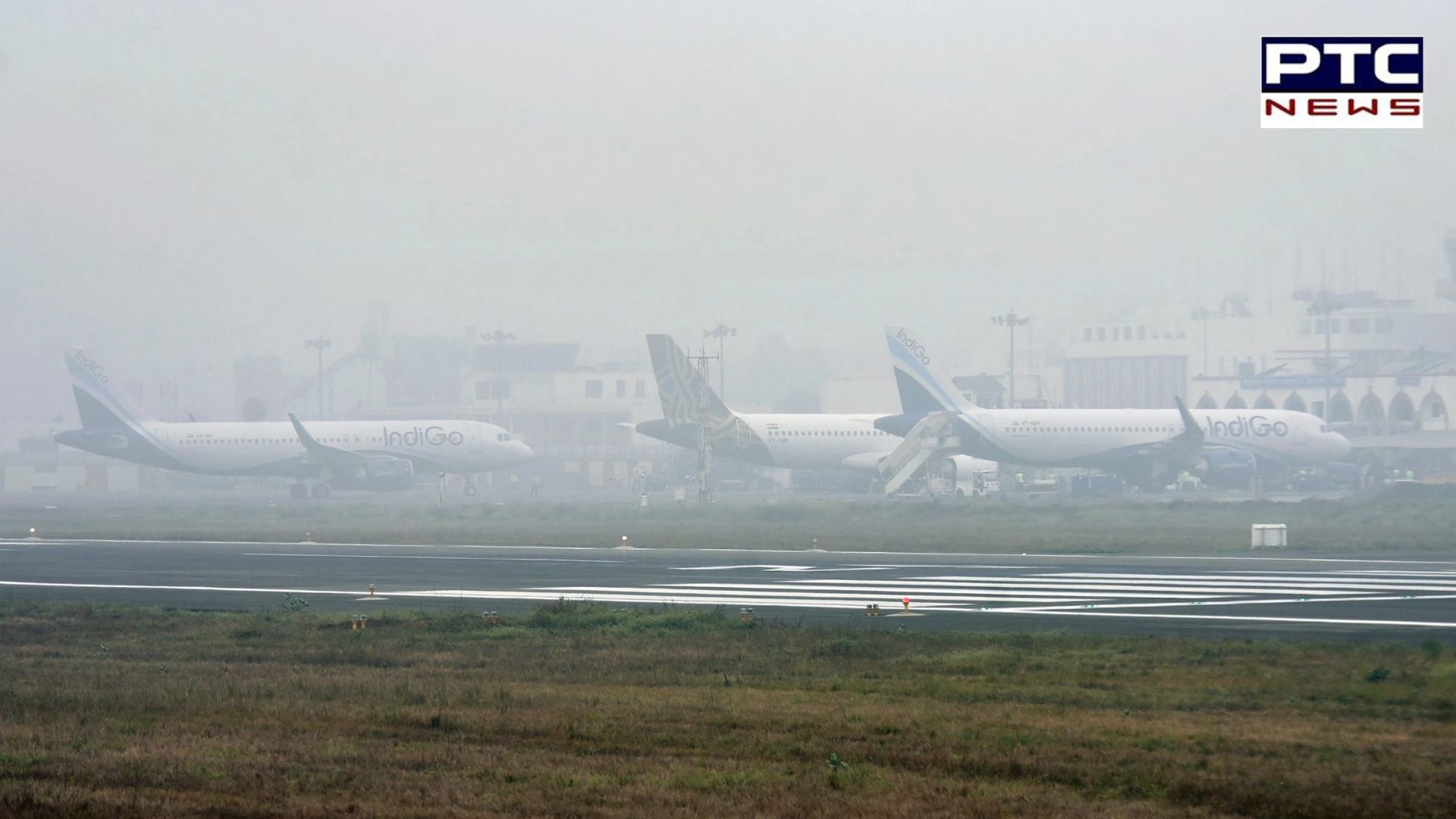

Airport havoc: 300 flights cancelled, 40,000 passengers affected
PTC News Desk: In the aftermath of an incident where an IndiGo passenger assaulted a pilot, the true extent of airport havoc unfolded, revealing a staggering impact on flight operations. IndiGo reported a mere 22 er cent on-time performance (OTP) at six major metro airports, while AIX Connect (formerly AirAsia India) managed just over 30 per cent on-time flights. Air India's OTP plummeted to 18.6 per cent on Monday.
The chaos ensued after the routine maintenance-linked closure of a runway extended beyond the scheduled duration. Additionally, an unprecedented blanket of fog disrupted both take-offs and landings for several hours. The situation was exacerbated by inadequate communication from airlines, leaving passengers stranded inside planes for extended periods.
/ptc-news/media/media_files/0jrfcESjfTCQ130lkYhp.jpg)
The security and safety protocols at the airport came under scrutiny, particularly when passengers of a diverted flight were made to undergo security checks again after deplaning. This unexpected situation led to passengers sitting on the tarmac, sparking concerns about airport management during adverse weather conditions.
The On-Time Performance (OTP) witnessed a sharp decline, with IndiGo's OTP at a mere 22 per cent and AIX Connect reporting just over 30 per cent. Air India, too, struggled with an OTP of 18.6 per cent on Monday. These figures, encompassing the top six airports in the country, represent over 70 per cent of all departures and arrivals. IndiGo, operating an average of 1760 domestic departures daily, saw a significant impact on its flight schedules. At a 22 per cent OTP, only around 387 flights would have been on time, assuming the airline operated as planned. However, indications suggest that not only IndiGo but other airlines also faced disruptions, resulting in widespread inconvenience for passengers.
Drop in Departures: Between January 1st and 13th, India witnessed an average of 2883 domestic departures, carrying 428,370 passengers. However, on January 14th, departures plummeted to 2552, with passenger numbers reduced to 381,259. The following day, January 15th, saw a further decline in departures to 2598, carrying 390,216 domestic passengers.
Impact on Passenger Numbers: Over these two days, there has been a notable reduction of approximately 330 flights and an average of 40,000 fewer domestic passengers departing. For those informed in advance, this may have spared them the ordeal of cancellations while still away from the airport, unlike instances where passengers faced cancellations after being on the aircraft for extended periods.
/ptc-news/media/media_files/ZNtd52jwvGDkmy34Hvw2.jpg)
High Load Factors: Despite the disruptions, airlines aimed to accommodate stranded passengers on the next available flights, leading to fuller flights waiting on the tarmac. Some flights were either awaiting their turn to take off or were boarded but awaiting pilots or crew members.
Financial Implications: In December of the previous year, 1935 passengers were denied boarding, over 35,000 were affected by cancellations, and 3.64 lakh passengers faced delays, resulting in financial compensation of Rs. 173 lakhs, Rs. 105 lakhs, and ₹544 lakhs, respectively. However, the recent delays due to fog-induced circumstances are considered force majeure, exempting airlines from financial obligations.
Operational Questions: While these delays may not have financial implications, questions arise about the airline's ability to operate flights promptly if the crew had been available on time. The connection between crew availability and weather conditions, such as fog or shortages, raises queries about operational efficiency.
Also Read: Mahua Moitra of Trinamool directed to vacate government bungalow immediately
Also Read: Delhi faces persistent fog and cold wave; orange alert, travel disruptions
Amidst regulatory intervention and ministerial efforts to control the damage caused by recent airline disruptions, there is a pressing need to reevaluate procedures that strand passengers inside planes for extended periods, often without essential amenities.
Inadequacies in Current Procedures: The existing practice of confining passengers within the aircraft raises concerns, particularly regarding the lack of provisions for food and the uncomfortable seating conditions. Airline seats, devoid of luxuries and with limited recline, pose challenges for passengers, especially those with infants or elderly individuals requiring wheelchair assistance, making prolonged seating difficult.
Critical Questioning of Procedures: As regulatory bodies and ministers step in to address the situation, it is imperative to question the rationale behind holding passengers hostage inside planes for extended durations. The fundamental query revolves around the feasibility of this practice, given its impact on passenger well-being.
Potential Solutions: Deplaning passengers during extended delays presents a viable solution, granting them access to terminal facilities, including washrooms and essential food services. Additionally, terminals provide crucial charging points for electronic devices, a feature often lacking on airplanes in India. While this approach may disrupt the sequence and necessitate additional security checks, it proves preferable to leaving passengers stranded without updates.
Need for a Comprehensive Overhaul: Implementing a comprehensive overhaul of existing procedures requires collaboration among airlines, operators, the Airports Authority of India, and the Bureau of Civil Aviation Security (BCAS). The aim is to transition from the current practices to a more humane and passenger-friendly approach promptly.
As stakeholders work towards resolving recent incidents, prioritising passenger comfort and well-being becomes imperative, demanding a swift and comprehensive transformation in the operational procedures of the aviation industry.
Also Read: Post-Galwan, Indian and Chinese troops clash twice along LAC: Report
Also Read: Delhi faces persistent fog and cold wave; orange alert, travel disruptions
(Inputs from agencies)
-
